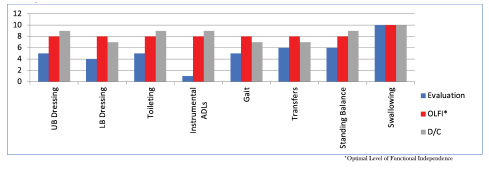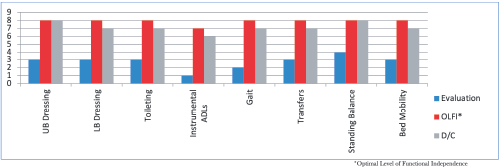Case Study
Admitting Diagnosis: Bronchopneumonia
Specialty Program: Cardiopulmonary
Discharge Location: Home
Mrs. J.B.R. was admitted to Chestnut Woods Rehabilitation and Healthcare Center from Mass General Hospital for continued skilled nursing and rehab needs with a diagnosis of Bronchopneumonia. Upon admission, she was evaluated by and participated with skilled physical, occupational and speech therapy. Mrs. J.B.R. was noted to require standby assistance to transfer and contact guard assistance to ambulate 200 feet while using a rolling walker. She was also noted to require contact guard to minimum assistance for all self-care tasks and a swallowing deficit, requiring a mechanical soft diet with nectar thick liquids. Mrs. J.B.R. also demonstrated decreased balance and activity tolerance increasing her risk for falling. As she progressed with her therapy goals, she was able to participate in higher level functional activities such as meal preparation to ensure her endurance and safety were maintained. She was also educated to be able to provide herself with the current recommendations from speech therapy for a safe discharge home. Upon discharge, Mrs. J.B.R. was able to transfer, ambulate 300 feet with a rolling walker and perform lower body dressing with supervision and was able to perform all other self-care tasks with modified independence. Great Work, Ms. J.B.R.!

10.0 – Complete Independent – No assist, no equipment
9.0 – Modified Independent – No Assist, but equipment or extra time
8.0 – S/u – No physical assist other than set-up; supervision for safety/technique; and/or single cue to initiate
7.0 – Supervision-No physical assist; supervision for safety/technique; and/or single cue to initiate
6.0 – SBA-Pt. performs task with close supervision and or visual/verbal cues for task completion
5.0 – CGA – Contact Guard Assist
4.0 – Min – Occasional assist (25% or less time or effort to complete)
3.0 – Mod – Frequent assist (40-50% of the time or effort involved to complete task
2.0 – Max – Constant assist (75-90% of the time or effort involved to complete task
1.0 – CD – Complete Dependence: No contribution from pt; task done by others or not assessed
Case Study
Admitting Diagnosis: Closed Right Pubic Ramus Fracture
Discharge Location: Home
A 90-year-old gentleman was admitted to Chestnut Woods Rehabilitation and Healthcare Center from Beth Israel Deaconess Hospital for continued skilled nursing and rehab needs following a fall that resulted in a hip fracture. Upon admission, Mr. Y was evaluated by and participated with skilled physical and occupational therapy. He was noted to require moderate assistance for bed mobility and transfers and was unable to ambulate. He also was noted to require moderate assistance for most self-care tasks. Mr. Y. demonstrated decreased balance and activity tolerance increasing his risk for falling. As he progressed with his therapy goals, he was able to participate in higher-level functional activities such as meal preparation to ensure his endurance and safety was maintained. Upon discharge, Mr. Y. was able to perform bed mobility, transfer and ambulate 100 feet with a rolling walker and supervision and was able to ascend and descend more than 15 stairs with standby assistance. He was also able to complete all self-care tasks with standby and setup assistance. He made great gains toward his therapy goals and was able to return home at an increased level of independence with home health services. Great work, Mr. J.Y.!

10.0 – Complete Independent – No assist, no equipment
9.0 – Modified Independent – No Assist, but equipment or extra time
8.0 – S/u – No physical assist other than set-up; supervision for safety/technique; and/or single cue to initiate
7.0 – Supervision-No physical assist; supervision for safety/technique; and/or single cue to initiate
6.0 – SBA-Pt. performs task with close supervision and or visual/verbal cues for task completion
5.0 – CGA – Contact Guard Assist
4.0 – Min – Occasional assist (25% or less time or effort to complete)
3.0 – Mod – Frequent assist (40-50% of the time or effort involved to complete task
2.0 – Max – Constant assist (75-90% of the time or effort involved to complete task
1.0 – CD – Complete Dependence: No contribution from pt; task done by others or not assessed




